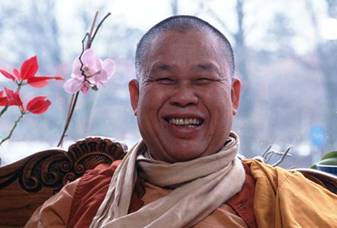Mindfulness in Daily Life
One very often asked question and very common problem for lay disciples is how can they maintain there mindfulness in daily life.
First important recommendation is – I know it sounds horrible – wake up 5 minutes earlier. Yes, that’s a big step towards happiness.
In the morning the mind is not so busy yet, so it is easier to gain concentration without much effort. Set your alarm clock 5 to 10 minutes earlier, that’s enough and then sit up and bring your attention to your breath,
– to the tip of your nose, seeing the cool wind entering your nose, when you breathe in and a warm wind coming out of your nose while breathing out;
– or watch your abdomen – seeing it’s rising and falling movement while breathing in and out.
Watch this just for 5 minutes before you start to do your morning duties. Just this much will change your whole day, believe me, because you give the day the right impulse, you start it in the most wholesome way possible.
Normally we start it with: “oh not again another day, it’s too early to wake up, too cold, too rainy”…etc….that’s not a very good start isn’t it? But that’s the first impulse you give the whole day, consider that.
The second exercise: make up your mind, that at certain times in your day, you try to be mindful…example: whenever I go to the toilet, I try not to think. That’s means from the moment you enter the toilet and close the door, you stop thinking. When you see a thought arising, notice it as thinking, thinking, thinking…. and let it go and come back to the breath.
Consider that you go to the toilet let’s say 8 times a day – sometimes for 1 minute sometimes for 5 to 10 minutes and you try to be mindful every time, you gain at least another ½ hour of meditation, that’s great. And it is a continuous meditation you can do many times every day.
This exercise conditions your mind. “Our mind” is nothing else than condition, there is no self, no one – but habits, and what we do when we meditate, is to change these conditions towards a wholesome, or even neutral flow. In this case we change it to the habit to be mindful, to know what’s there in the present moment. Not to let the mind wander but bring it back to the body. The body (the breath) is always in the present moment, you usually don’t know the breath from yesterday or tomorrow – isn’t it?
For some people it’s possible to exercise in the following way: whenever they enter the tram, the bus or the train to go to work, school, shopping wherever…. they try to exercise in the above explained way, until they get off the tram etc….
Just make clear, that all the thoughts you have in your mind while doing these things are not really that useful. You have 24 hours a day time to think, but it’s already too much to give yourself ½ hour without thinking!
We have to learn to be able NOT TO THINK as well, we are very good in thinking, no one needs to be pushed to do so, and most of the time it’s useless or even dangerous stuff we think and so suffering arises, but almost no one is able to stop the thinking. That can’t be healthy. Our mind is like a machine and every machine needs to stop sometimes, our mind usually never stops 24 hours a day, even while sleeping we still continue in the form of dreaming.
This doesn’t mean that we stop thinking that’s anyway impossible but we can learn how to think wisely. Think what is useful and not what creates more suffering, these kinds of thoughts are not wise. You can check if you have wholesome thoughts or not by checking if they lead you to suffering or not. When they lead to suffering they can’t be wholesome, so better know them and let them go.
Then a good exercise is also to come back to your body as often as you can, know what the body is doing now. Walking, sitting, bowing down, standing up, running, writing, cleaning, eating, etc….when you get lost in useless thoughts again, just stop the moment you know it and try to come back to the body.
One – more advanced – exercise is, to try to watch your mind and your motivations in daily activities.
Example: when you talk to someone you can still be aware that now you are talking and what is your motivation when you say something to someone, check this from time to time.
What is your motivation to do certain things in your daily life? Ask yourself whenever you remember this instruction. Is desire or anger the impulse behind your activity and speech? Then it will sooner or later lead to unpleasant results.
This kind of exercise will also become a habit and you will learn much more about your own mind and how it works. And you will understand why suffering arises and how it ceases. So the understanding of cause and effect will become deeper. This is seeing the four noble truths that the Buddha taught – in your daily life. Seeing the Suffering, seeing its cause and seeing the cessation of Suffering and its cause. This is wisdom. Wisdom is not in the sitting cushion – but it arises in your mind if you contemplate in a correct way, in all your daily activities. You don’t have to be a monk or nun to understand the Buddha’s Dhamma, the Buddha’s wisdom is open for everyone it only depends on your own mindfulness and right contemplation to arise. So try to make this effort every day, whenever you remember and it will have great results.
Wish you all the best and much progress in your practice.



